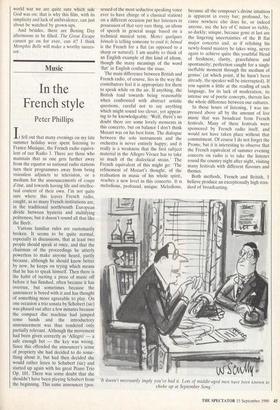Music
In the French style
Peter Phillips
It fell out that many evenings on my late summer holiday were spent listening to France Musique, the French radio equiva- lent of our Radio 3. There are those who maintain that as one gets further away from the equator so national radio stations turn their programmes away from being visionless adjuncts to television, or a medium for the announcements of coups d'etat, and towards having life and intellec- tual content of their own. I'm not quite sure where this leaves French radio, caught, as so many French institutions are, in the traditional north/south European divide between hysteria and stultifying politeness; but it doesn't sound all that like the Beeb.
Various familiar rules are customarily broken. It seems to be quite normal, especially in discussions, that at least two people should speak at once, and that the chairman of the proceedings be utterly powerless to make anyone heard, partly because, although he should know better by now, he keeps on trying which means that he has to speak himself. Then there is the habit of turning a piece of music off before it has finished, often because it has overrun, but sometimes because the announcer is bored with it and has thought of something more agreeable to play. On one occasion a trio sonata by Schobert (sic) was phased out after a few minutes because the compact disc machine had jumped some bands and the introductory announcement was thus rendered only partially relevant. Although the movement had been given correctly as 'Allegro' — a safe enough bet — the key was wrong. Since this offended the announcer's sense of propriety she had decided to do some- thing about it, but had then decided she would rather listen to Schubert (sic) and started up again with his great Piano Trio Op. 101. There was some doubt that she shouldn't have been playing Schubert from the beginning. This same announcer (pos-
sessed of the most seductive speaking voice ever to have charge of a classical station) on a different occasion put her listeners in possession of that very rare thing, an idiom of speech in general usage based on a technical musical term. Mettez quelques bemols is telling someone to cool it; bemol is the French for a flat (as opposed to a sharp or natural). I am unable to think of an English example of this kind of idiom, though the many meanings of the word 'flat' in English confuse the issue.
The main difference between British and French radio, of course, lies in the way the contributors feel it is appropriate for them to speak while on the air. If anything, the British tend towards being reasonable when confronted with abstract artistic questions, careful not to say anything which might sound too clever, yet appear- ing to be knowledgeable: 'Well, there's no doubt there are some lovely moments in this concerto, but on balance I don't think Mozart was on his best form. The dialogue between the solo instruments and the orchestra is never entirely happy; and it really is a weakness that the first subject material in the Allegro Vivace has to take so much of the dialectical strain.' The French equivalent of this might go: 'The refinement of Mozart's thought, of the realisation in music of his whole spirit, reaches a new level in this concerto. It Is melodious, profound, unique. Melodious, because all the composer's divine intuition is apparent in every bar; profound, be- cause nowhere else does he, or indeed anyone, use the key of C minor so richly, so darkly; unique, because gone at last are the lingering uncertainties of the B flat major concerto and, as if relishing his newly-found mastery he takes wing, never again to achieve quite this youthful blend of freshness, clarity, gracefulness and spontaneity; perfection caught for a single ineffable moment through the medium of genius' (at which point, if he hasn't been already, the speaker will be interrupted). If you squirm a little at the reading of such language, for its lack of moderation, its intense use of poetic concepts, therein lies the whole difference between our cultures.
In those hours of listening, I was im- pressed above all by the amount of live music that was broadcast from French festivals. Many of these festivals were sponsored by French radio itself, and would not have taken place without that commitment. Of course I do not forget the Proms; but it is interesting to observe that the French equivalent of summer evening concerts on radio is to take the listener round the country night after night, visiting many festivals with different flavours and themes.
Both methods, French and British, I 'believe produce an exceptionally high stan- dard of broadcasting.
'It doesn't necessarily imply you've had it. Lots of middle-aged men have been known to choke up at September Song.'


























































 Previous page
Previous page